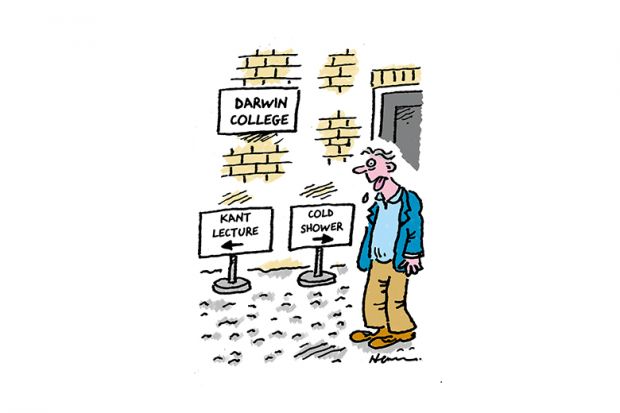
Have you ever been so distracted by an academic’s good looks that you head to the “rougher end” of Cambridge in search of a sex worker? No? That might come as a surprise to Lloyd Evans, The Spectator’s theatre critic, who not only did just that but then felt the need to confess to the incident in excruciating detail in the magazine. Mr Evans recounted his experience of attending a philosophy lecture given by London School of Economics professor Lea Ypi at Darwin College, Cambridge, only to find himself more interested in her lengthy blonde hair than her musings on Kant. “I just find clever and articulate women very attractive,” he defended himself to The Daily Telegraph. Likely to now be less than welcome in most lecture theatres, perhaps Mr Evans should stick to reviewing the actual theatre. Just don’t let him get his hands on a ticket to Legally Blonde: The Musical.
Living away from home for the first time, cooking for yourself and having to survive on a paltry student loan – these tend to be the main concerns for fresh-faced 18-year-olds heading to university. But for one student from China, a more pressing matter has been weighing on his mind: whether or not, if he studies in Germany, he’ll be forced to smoke weed. Who better to put the anxious student’s mind at rest than the German chancellor himself? After the question was posed during a visit to Shanghai’s Tongji University, Olaf Scholz reassured the audience that no, Germany’s cannabis laws do not mean students will be forced to partake in the green stuff, The Times reported. “I’ll be 66 this year and I’ve never smoked cannabis,” Mr Scholz admitted. Whether that was the answer the student was hoping for remained unclear.
One semi-retired academic has found himself inundated with calls and emails from Donald Trump supporters hoping to connect with the former president. The professor in question is not a die-hard Maga supporter or even an acquaintance of Mr Trump – he just happens to share a name with someone who is. Mike Lindell, a 77-year-old emergency preparedness expert and Texas A&M University emeritus professor, has never sold a pillow in his life, but the rise to fame of the other Mike Lindell, the MyPillow chief executive and avid Trump supporter, has added an unexpected level of complication to Professor Lindell’s life. The professor told The Guardian that he felt a “sense of revulsion” at the mistake. However, the two Mikes are not completely different, as the elder one conceded: “He sells pillows, and I put students to sleep, so we’re sort of in the same line of business.”
As pro-Palestinian demonstrations on US campuses escalate and politicians grow increasingly critical of institutions’ response, Columbia University’s Baroness Shafik was the latest university president to appear before Congress. Despite the leaders of three other elite institutions having already faced similar trials, Lady Shafik appeared ill-prepared at times, particularly when it came to discussing the fate of Joseph Massad, a tenured Arab politics professor who has come under fire for describing the 7 October attacks by Hamas as “awesome”. Asked if she would revoke a key committee chairmanship held by Professor Massad, Lady Shafik initially agreed to review it before finally promising to remove him. “I need to confirm that,” she said, until prodded again, she added: “I think that would be,” paused again, and said, “Yes – let me come back with ‘yes’,” in the manner of someone desperately attempting to save their own job by throwing one of their colleagues under the bus.
It’s official: lucky Joe Bloggs is more likely to succeed at university than poor Jane Doe, but only by virtue of appearing higher up the register. A study from the University of Michigan analysed more than 30 million assessment records and found that students whose surnames begin with W, X, Y and Z received grades approximately 0.6 point lower than their peers whose surnames begin with A, B and C, Inside Higher Ed reported. Alphabetically disadvantaged students also received comments that were more negative and less polite, presumably from tutors at the end of their tether after a long day of marking. Researchers suggested that the problem could be solved by changing online learning management systems to order assignments randomly, thus ensuring that students are equally subject to their teachers’ bad moods. Universities should be a place of inclusion, after all.
Register to continue
Why register?
- Registration is free and only takes a moment
- Once registered, you can read 3 articles a month
- Sign up for our newsletter
Subscribe
Or subscribe for unlimited access to:
- Unlimited access to news, views, insights & reviews
- Digital editions
- Digital access to THE’s university and college rankings analysis
Already registered or a current subscriber? Login



